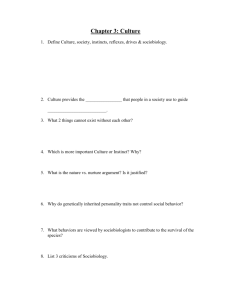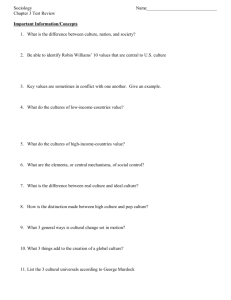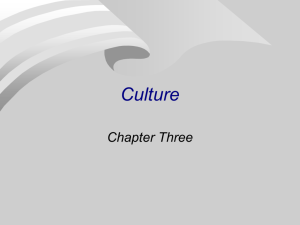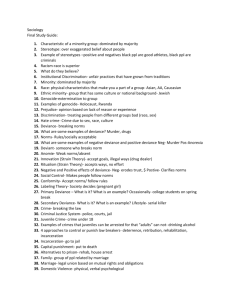sociology_final_review_rachel_j
advertisement
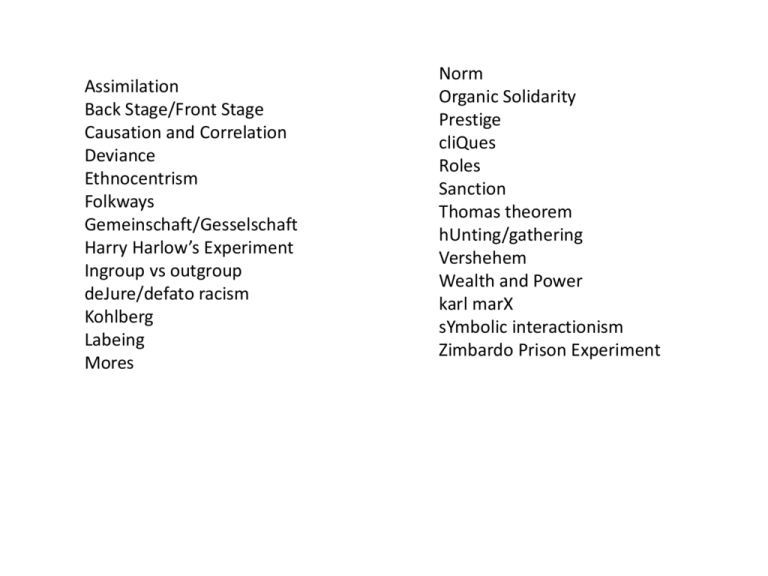
Assimilation Back Stage/Front Stage Causation and Correlation Deviance Ethnocentrism Folkways Gemeinschaft/Gesselschaft Harry Harlow’s Experiment Ingroup vs outgroup deJure/defato racism Kohlberg Labeing Mores Norm Organic Solidarity Prestige cliQues Roles Sanction Thomas theorem hUnting/gathering Vershehem Wealth and Power karl marX sYmbolic interactionism Zimbardo Prison Experiment IS FOR Assimilation Assimilation is the blending of minority groups into dominant society. The theories of assimilation include Melting Pot (many groups in, Americans come out), Mixing Bowl (Become American, but hold onto traditions), Anglo-conformity (Everyone conforms to American ways), Accommodation (just put up with different groups) IS FOR Backstage and Front stage Backstage/Front stage is part of Goffman’s Dramaturgical Approach which states that life is like a drama and everyone has front stage and backstage. Front stage is how you manage the impression people have of you. Back stage is more casual and less formal. For instance, while a student might raise their hand and do their homework for their front stage, they will complain about a class and a teacher while in their back stage. IS FOR Causation and Correlation Causation is the idea that one event leads to another. Multiple causation is when several factors combine. Correlation is the relationship between two different items, that are related to some extent. For instance, the legalization of abortion decreased crime rates. IS FOR Deviance Deviance is behavior that violates a norm. It depends on the time and place you live. Society decides what is deviant, and the way society reacts is more important than the action. There is positive deviance, which is an overconformity to norms, an example is anorexia. There is negative deviance which is a rejection of norms, which is crime. Benefits of deviance include promoting social change, clarifying norms, and promoting unity. IS FOR Ethnocentrism Ethnocentrism is thinking that one ethnicity is superior to others. For instance, ethnic jokes and stereotypes are examples of ethnocentric behavior. Also, white supremacist organizations such as the Klu Klux Klan are ethnocentric organizations. IS FOR Folkways Folkways are everyday habits and manners. If you violate a folkway, you are considered a “slob.” Folkways help people get along. An example of a folkway is brushing your teeth. If you don’t brush your teeth, you are considered gross. IS FOR Gemeinschaft and Gesselschaft Gemeinschaft is an intimate community, such as a small farming village with the same ideas and beliefs, where you know everyone. The Amish are a Gemeinschaft community. Gesselschaft is impersonal association, where lives are not centered on family, most time is spent with strangers. American society is generally gesselschaft. IS FOR Harry Harlow’s Experiment 1950’s Harry Harlow’s monkey experiment proves that nurture triumphs over nature. Harry Harlow created two “mother” monkeys, one was rough, but had food, the other was soft and comforting. The monkeys spent more time with the soft monkey “mother” than the wire monkey “mother.” The monkeys chose comfort over food. IS FOR Ingroup versus Outgroup A group is people who have something in common and believe that the thing they have in common is significant. Ingroup is people like you, and an outgroup is people different than you. IS FOR de Jure and de facto racism De Jure racism is discrimination by law. For instance, in Plessy v. Ferguson in 1896, the Supreme court ruled that facilities could be separate but equal. De facto racism is racism by practice, not by law, it is everyday practice of discrimination. IS FOR Kohlberg Kohlberg created moral development sequences. The first is from age 0-6, and is amoral (no sense of morals). The second is from 7-10 and is preconventional, where you learn the rules. The third is conventional from ages ten and older, and where you try to follow society’s norms. The final is Adult, which is post conventional, where you model right and wrong and question what if. IS FOR Labeling Labeling can be racial, gender, ethnic, wealth, age, social class, etcetera. It is a self fulfilling prophecy. You act in a way to fill the label. Sykes and Matza say that people resist labels. For instance, if you label someone as deviant, they will act more deviant in order to fill that label. IS FOR Mores Mores are norms vital to the well being of society and to our values. They are universal. For instance, no incest, and there is very strong punishment if you are caught. IS FOR Norms Norms are specific guidelines for behavior. They describe what is expected. Norms are often converted into laws. For instance, you cannot date your sister. IS FOR Open Question and Closed Question Open questions provide a true and honest answer while revealing attitudes, but they are harder to count and see trends. Closed question has limited answers, is easy to count, and easy to see trends and patterns. Surveys are very common forms of questionnaires. IS FOR Prestige Prestige is your social position. It generally comes with respect and honor. Prestige is valued and honored. Upper class has more prestige than lower classes. Different presidents can have different levels of respect. For instance, Abraham Lincoln versus Richard Nixon. IS FOR Quantitative and Qualitative Quantitative data is data involving numbers. Qualitative data is descriptive. Qualitative data allows for more feeling. IS FOR Roles Roles are expected behaviors that lead to obligations and privileges. You occupy a status within society and the role you play depends on the status. Ascribed role is what you are born with, such as being a woman. Achieved role is a role you earn, such as CEO. IS FOR Sanction Sanctions are punishments for violating norms or reward for following them. There are positive, negative, formal, and informal sanctions. For instance, a positive informal sanction would be “good job.” A negative informal sanction would be a frown. A positive formal sanction would be honor roll. A negative formal sanction would be jail time. IS FOR Thomas Theorem 1928 “If men define situations as real, they are real in their consequences” IS FOR Hunting and Gathering Society This society has the most equality. The men hunt, the women gather. It is a nomadic society. It is the most simple society. IS FOR Verstehen It is a concept created by Weber. It is a way to examine society through the use of symbolic relationships. IS FOR Wealth and Power Wealth is concentrated. The wealthy are getting wealthier, and the poor are getting poorer. The wealthiest ten percent of Americans own 70% of the nation’s wealth. Power does not necessarily come from wealth. Power can come from knowledge, wisdom, or influence. For instance, Hispanics can swing the vote in the election. IS FOR Karl MarX Karl Marx created the conflict theory. The conflict theory states that the key to human history is class conflict between the bourgeoisie (wealthy) and the proletariat (worker). There are opposing interests, competition, and change. Wealth, prestige, and privilege lead to power. An example of the conflict theory is race relations, the dominant race keeps the other races in a subordinate position IS FOR sYmbolic Interactionism Symbolic interactionism was created by Cooley and Meade. Symbols help define yourself and others. It helps to determine what you “should” and “should not” do. Interactions are based on mutually understood symbols, such as a flag and cross. IS FOR Zimbardo’s Prison Experiment Some students participated in the experiment as prison guards, and some students were the prisoners. Within a few days, the guards became sadistic, and the prisoners became extremely depressed. Both the prisoners and the guards became deeply attached to their roles.

